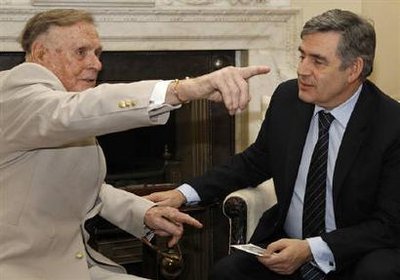Courtesy: Mike Collett-White
LONDON (Reuters) – It took him more than 60 years to break his silence, but in a new book 92-year-old Denis Avey tells the story of how he broke into Auschwitz concentration camp twice to witness for himself the horrors of the Holocaust.
Avey was a British soldier captured during World War Two and sent to a labor camp close to Auschwitz where he worked at the IG Farben plant alongside inmates from the concentration camp, nicknamed “stripeys” after their uniforms.
 |
| Britain’s Prime Minister Gordon Brown (R) chats to Auschwitz survivor Denis Avey at number 10 Downing |
While Avey, a headstrong, battle-hardened soldier, was told about the mass extermination of Jews and experienced the sickening smell from a nearby crematorium, he wanted to see for himself what was happening in Auschwitz.
While conditions in his own labor camp were appalling, the food was better and treatment less harsh than in Auschwitz.
And as a prisoner of war, Red Cross packages occasionally made it through containing chocolate and cigarettes, which could then be bartered for better provisions and aid survival.
After weeks of preparation, including bribes to a guard, Avey twice swapped uniforms with a Dutch Jew of roughly the same height to sneak into the camp where he spent the night.
On both occasions the men managed to change back into their own clothes, despite the risk of discovery and certain death.
“I did my homework over weeks and weeks, but the common denominator of all that was a tremendous amount of luck,” Avey said in an interview to promote his biography “The Man Who Broke Into Auschwitz,” co-written by Rob Broomby and published in Britain by Hodder & Stoughton.
“My life depended on 50 cigarettes — 25 in, 25 out. He (the guard) could have shot me easily.”
His motivation for risking his life was twofold: to “put one over on the enemy” and to see what was happening so he could tell the world afterwards of the atrocities.
He recorded seeing piles of “vaguely human” corpses of workers who died each day. They were carried away by fellow inmates who showed no emotion. Body carriers collapsed, earning them a beating and almost certain death.
TOO WEAK TO RESIST
Men were pulled from lineups and taken away to be gassed, but there was no protest, so weak and dejected had they become.
Avey described the “foul air” of the sleeping area and putrid “soup” the men were served which he dared not eat.
He held whispered conversations with the inmate lying next to him who was in on the plan, finding out what he could about the concentration camp.
“Auschwitz III was like nothing else on earth; it was hell on earth. This is what I had come to witness but it was a ghastly, terrifying experience.”
After surviving the camp and the “death march” at the end of the war, Avey tried to tell the army about his experiences, but when he came up against what he called the “glazed eye syndrome,” he gave up and kept silent for 60 years.
Even his mother did not know what he had been through, and never asked why he was so emaciated when he returned to England.
For six years Avey had regular nightmares and woke up in a cold sweat. He still recalls his experiences today.
Then, during a radio interview a few years ago he opened up and told his story, and since then has gained recognition for his bravery from Holocaust organisations and politicians.
The International Raoul Wallenberg Foundation has honored Avey with a diploma, and a spokesman in Israel said: “We feel that his story is genuine,” adding that a fellow survivor corroborated his account to the foundation’s satisfaction.
Avey said his book was relevant today.
“The difference between right and wrong is fast receding. Awareness is being diluted, people are just saying ‘such is life’. People are like this now.”
Despite its dark content, the story ends on a note of hope.
Avey recently discovered that a Jew called Ernst survived Auschwitz and recorded his testimony on video.
In that testimony he talked about a soldier — Avey — who arranged for him to get 10 packs of cigarettes from England which he swapped for food and new soles on his shoes without which he said he would not have survived the death march.
“I thought he was dead,” said Avey. “I couldn’t believe it.”
